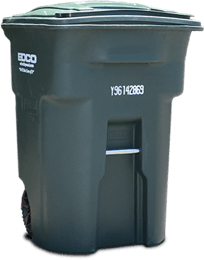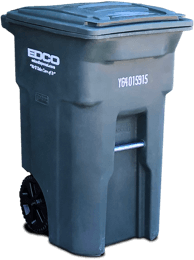EDI’s New Organics Recycling Program Collects Food Scraps and Yard Waste Mixed Together in Your Green Cart
New Organics Recycling Program Brochure
Folleto del Nuevo Programa de Reciclaje de Productos Orgánicos
EDCO’s New Organics Recycling Program will Collect Food Scraps and Yard Waste Mixed Together in Your Green Cart
Automated Organics Collection
Residential customers receive one GREEN 96-gallon organics cart. Use your green cart to separate landscape waste, food scraps, and other organic materials for collection each week on your scheduled service day and set out by 6 a.m. or the night before.
96-Gallon Cart
appx. 35.75" x 29.75" x 43.25"
64-Gallon Cart
appx. 31.75" x 24.25" x 41.75"
Request Additional Carts
Two additional green carts are available at no extra cost. Residents requiring a fourth 96-gallon cart or more may request additional green carts for a nominal monthly fee.
Residents can request additional recycling carts at no extra cost.
Request Additional Carts
| Recyclable Organics Includes |
- grass clippings
- brush
- weeds
- hedge trimmings
- branches
- leaves
- ice plant (in small amounts only due to weight)
|
- ivy
- floral decorations
- Halloween pumpkins
- Christmas trees (NO flocked trees)
- untreated and non-lead-based painted wood
- food scraps
- food-soiled paper
|
Place recyclable organics directly into your designated green cart. Do not use any kind of plastic bags (including certified compostable or biodegradable bags) for any type of green waste, food waste, or other organics collection or disposal, as they contaminate the Anaerobic Digester! All organic material must be placed loosely inside the green cart for collection. Paper bags are acceptable.
Please do not place any of the following materials in your green cart:
- No plastic bags.
- No trash or hazardous waste.
- No animal waste.
- No dirt, rocks, asphalt, concrete, sand, etc.
- No treated or lead-based painted wood or lumber.
Organic Waste

Organic waste is a renewable natural resource, and it mainly comes from yard and kitchen waste from homes and food waste, and scraps from industrial and commercial operations.
Mandatory recycling of organic waste is the next step to achieving California’s Zero Waste goals. EDI has constructed the first state-of-the-art, advanced technology Anaerobic Digestion (AD) Facility in San Diego County, capable of producing renewable natural gas that will serve the region’s needs.
Anaerobic digestion is an efficient and environmentally sustainable technology that can significantly contribute to organic waste management in California. Capturing and reducing the amount of methane released into the atmosphere is critical in ensuring a safe and healthy environment for ourselves and future generations.
EDI’s Anaerobic Digestion Facility
Since 1967, family-owned and operated EDI has had a long-standing commitment to reducing environmental impacts through innovation. EDI’s state-of-the-art AD Facility began serving customers in early 2021, assisting your community in fully complying with State Mandates and keeping us On the Road to Zero Waste.

AD is the natural process in which microorganisms break down organic materials such as food waste, green waste, fats, oils, and greases. Anaerobic digestion happens in closed spaces with no oxygen and converts organic material into Renewable Natural Gas (RNG) and fertilizer.
Recycling organics is easy and convenient with EDI’s commingled organics recycling program. EDI has expanded the source-separated green waste collection to include recycling food waste, and the service allows customers to place food scraps in the same container as green waste. EDI’s AD Facility is a foundation for your community to achieve State mandates, including AB 1826, AB 1594, and SB 1383, which are directly related to organics recycling in the State of California.
EDI’s Anaerobic Digestion and Food Waste Recycling Videos
Please watch our informative videos to learn more about EDI’s new AD Facility and Organics Recycling Program and how they will significantly impact the future of organic waste.
Why Recycle Food Waste?

Organic waste accounts for over 40% of California’s waste stream material. Organic material cannot break down when buried in a landfill, as it would in nature or a compost pile, because it decomposes without oxygen, releasing methane gas into the atmosphere. Organic material (food scraps and yard waste) is now recycled when placed in green carts and then transported to EDI’s AD Facility, where it will be converted into renewable natural gas and fertilizer.
What Will Go in the Green Cart?
Below are just a few examples of what will be able to be placed in your green organics cart.
Food Scraps
Fruit, vegetables, meat, bones, dairy, eggshells, prepared food

Food-Soiled Paper
Napkins, tea bags, paper plates, coffee filters

Yard Waste
Plants, leaves, branches, grass


Residents can request a Kitchen Caddie to transfer food scraps from the kitchen to an organics cart or compost pile conveniently.
Request a Kitchen Caddie













